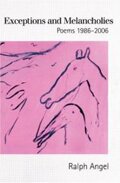42opus
is an online magazine of the literary arts.
22 July 2007 | Vol. 7, No. 2
A Kind of Listening Seems To Be Answering His Sight: Ralph Angel's Exceptions and Melancholies, Poems 1986-2006
 Exceptions and Melancholies, Poems 1986-2006
Exceptions and Melancholies, Poems 1986-2006
Ralph Angel
Sarabande Books, 2006.
175 pages. $15.95.
Check Amazon.com or Powell's Books.
Cartesian philosophy insists that the senses are unreliable. It is the significant ability of the mind to judge and to understand the world that distinguishes humanity with Self. When Descartes in Meditations on a First Philosophy considers his own nature, he concludes he is "a thinking thing… something that doubts, understands, affirms, denies, wills, refuses, senses and also has mental images." Ralph Angel, in his new and collected poems Exceptions and Melancholies Poems 1986-2006, perfects a voice that demolishes the distances of sensory experience. His poems are like filters of experience from the mindside, as it focuses, listens, waits for, messages, and attunes the mystery of existential wonder.
Fulfilling the promise of his early work, Angel's new book is characterized by deep consciousness, the rigors of his syntax anchoring his voice. His new poems exemplify what is true of the rest of his work collected here as he summons Self, human presence, from the collision of worldly details. If we exist in the noise of body, and commerce, and community, Angel's work captures sublimated landscapes of deep feeling and spiritual incident. Consider the first lines of the opening poem, "With Care":
Whoever has a quiet mind
up on the roof the season turned the bath towels purple.
Quiet is the demolition. The neighbors got to know each other
someday soon.
Displacement here is the strategy of being. Immediately, the poem forces us to acknowledge our own "bodiness" as we are absorbed by color. Also, a syntactical effect, in which tense itself is confused, forces us to question meaning. Though the line "someday soon" offers a sense of immediacy, the word "soon" distracts. Without warning we're suddenly in the past, or the future. In Angel's poetry this makes a portraiting effect, of a place, or an experience of knowing-a-place, which happens at all of our points of knowing it at once. Angel's sentences are trains that fly past us, as we glimpse ourselves in their momentary windows. "I said I found the lakes there," he writes in the same poem, "and odd pieces of meaning that h

